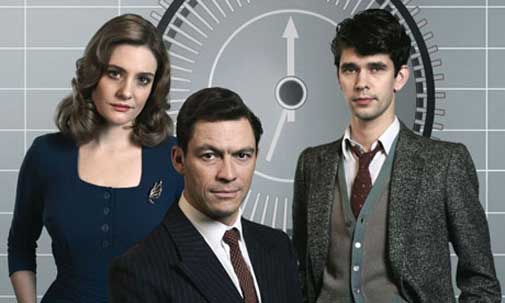
TVWW contributor Ed Bark, in his latest Uncle Barky's Bytes column, has beaten me to the punch by raving already about BBC America's new The Hour series (read his rave HERE).
But I'm adding my own praises anyway. Maybe it's because we're both old-school newsroom veterans, but this period drama about the birth of a meaningful British TV newsmagazine in the 1950s clearly speaks to us both. The costumes may hint of AMC's Mad Men -- but to me, the closer comparison is to the brilliant 2005 movie Good Night and Good Luck...
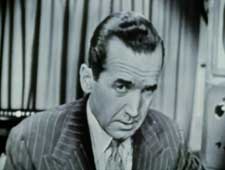
In the United States, the first significant TV newsmagazine, and news operation, was See it Now, overseen by anchor and editor Edward R. Murrow (right) -- then and now, the most legendary of figures at CBS News -- and produced by equally seminal figure Fred Friendly. The series began in 1951, determined to explore and exploit the possibilities of the new medium of television. In 1954, Murrow and Friendly took on self-proclaimed Communist-hunter Sen. Joe McCarthy, in a bold broadcast dramatized in Good Night and Good Luck, with David Strathairn as Murrow and George Clooney (who co-wrote, directed, and whose production company produced the film) as Friendly.
In the United Kingdom, the rough equivalents -- the first TV shows to generate news rather than regurgitate features and newsreels -- were the BBC News series Panorama, launched in 1953, and Tonight, which began in 1957. The Hour, the fictional series that gives its name to this new real series, is also set at the BBC, and splits the time difference by beginning in 1956.
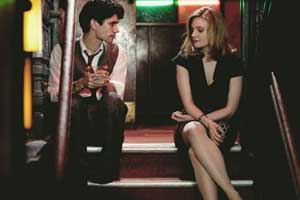
The primary characters in The Hour, which premieres Wednesday at 10 p.m. ET on BBC America, are fictional, too, but are based on amalgams of real British news figures. Bel Rowley, the ambitious TV news producer played by Romola Garai (right), is based on Grace Wyndham Goldie, who ran the news division at the end of the 1950s and was one of the few female TV executives in the world at that time.
And Dominic West plays well-connected news anchor Hector Madden, standing in for any number of square-jawed British anchors at the time.
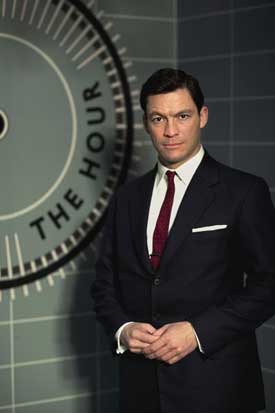
For American viewers, though, West (seen at right) will take some getting used to in this role. Though he was born in England, and the accent he sports in The Hour is his own, he's much more familiar as Jimmy McNulty, the Baltimore cop in HBO's The Wire. But he's really strong here, and as effortlessly likable as the character he plays.
The central figure in The Hour, though, is Freddie Lyon (photo below, with BBC camera), a young BBC News journalist played by Ben Whishaw. As the series begins, Freddie is as likely to be fired as to be promoted -- but he desperately wants in on the ground floor of a new TV show that promises to take the news more seriously. When an old friend suggests that a robbery-murder may lead to a larger story and conspiracy, he investigates, at the same time he's lobbying to join the new program staff.
Lucky for him, he's friends with Bel Rowley, who ends up being appointed producer, and who fights for his inclusion. She calls him James, as in Bond; he calls her Moneypenny. And this is before any of the 007 movies came out, so this repartee is based on a shared appreciation of the Ian Fleming novels alone.
In other words, how can you not root for these two? They're not only TV news people. They're readers!
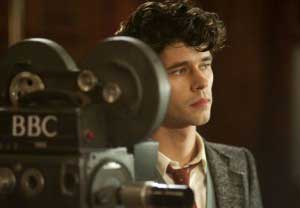
The Hour, at least the episodes made available for preview from BBC America, play like a period version of the original miniseries version of another excellent British TV import, State of Play. There's a murder mystery at the core, a massive conspiracy in the shadows, and an analysis of the way news is gathered and reported as a central theme.
All that, and McNulty with a British accent, too...